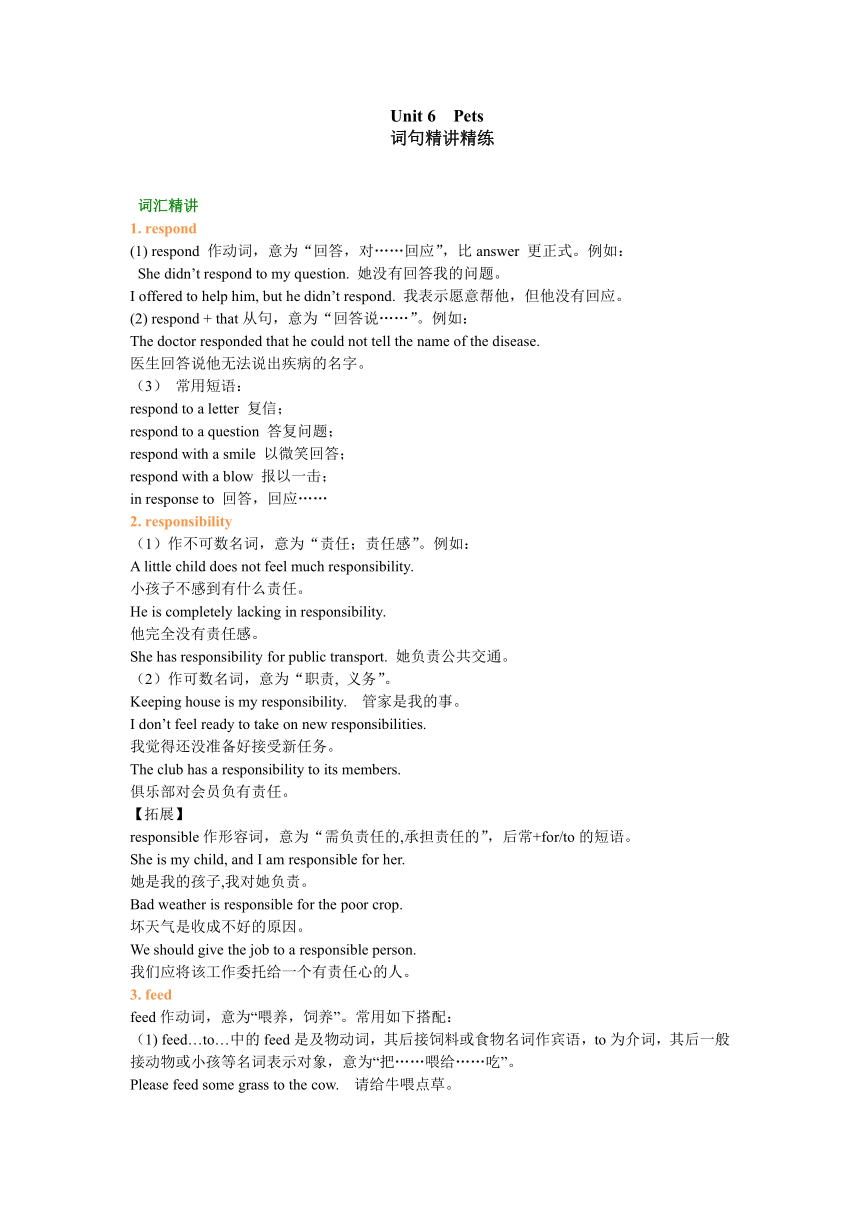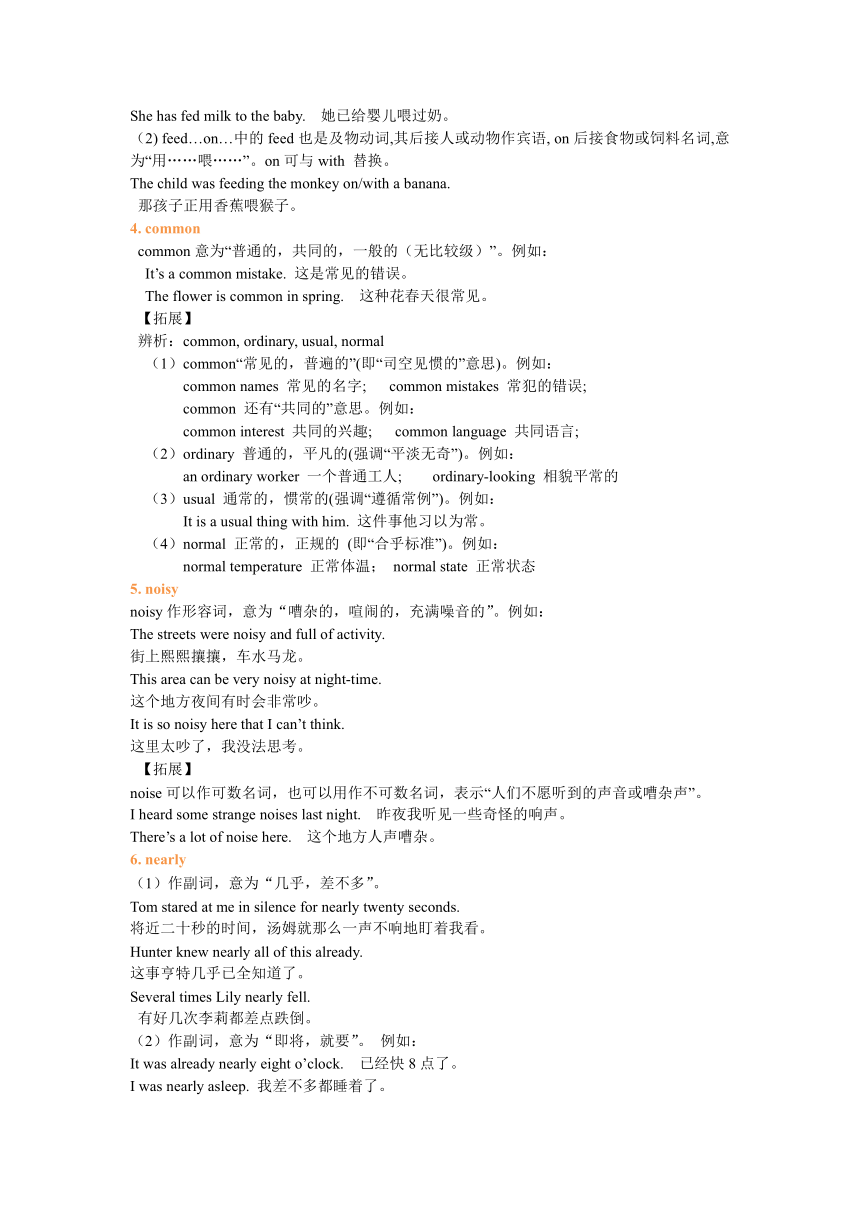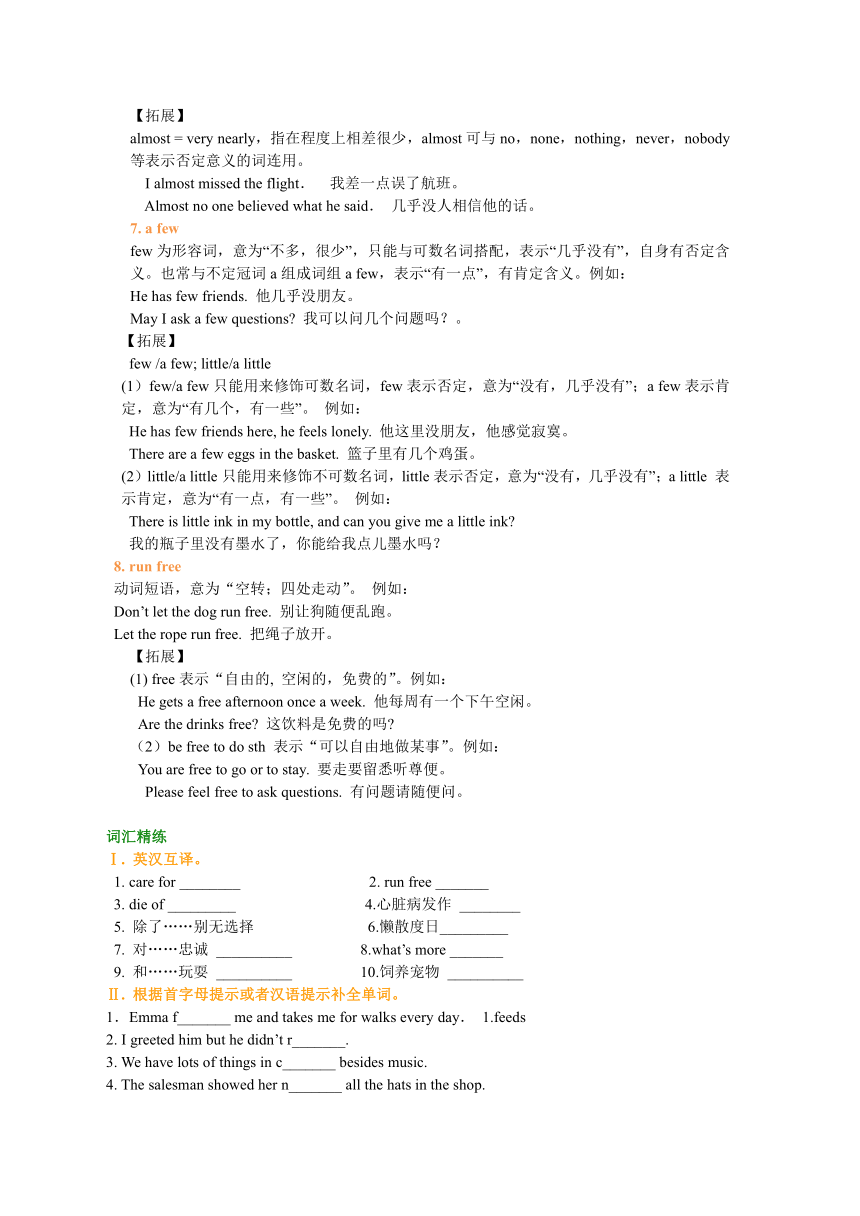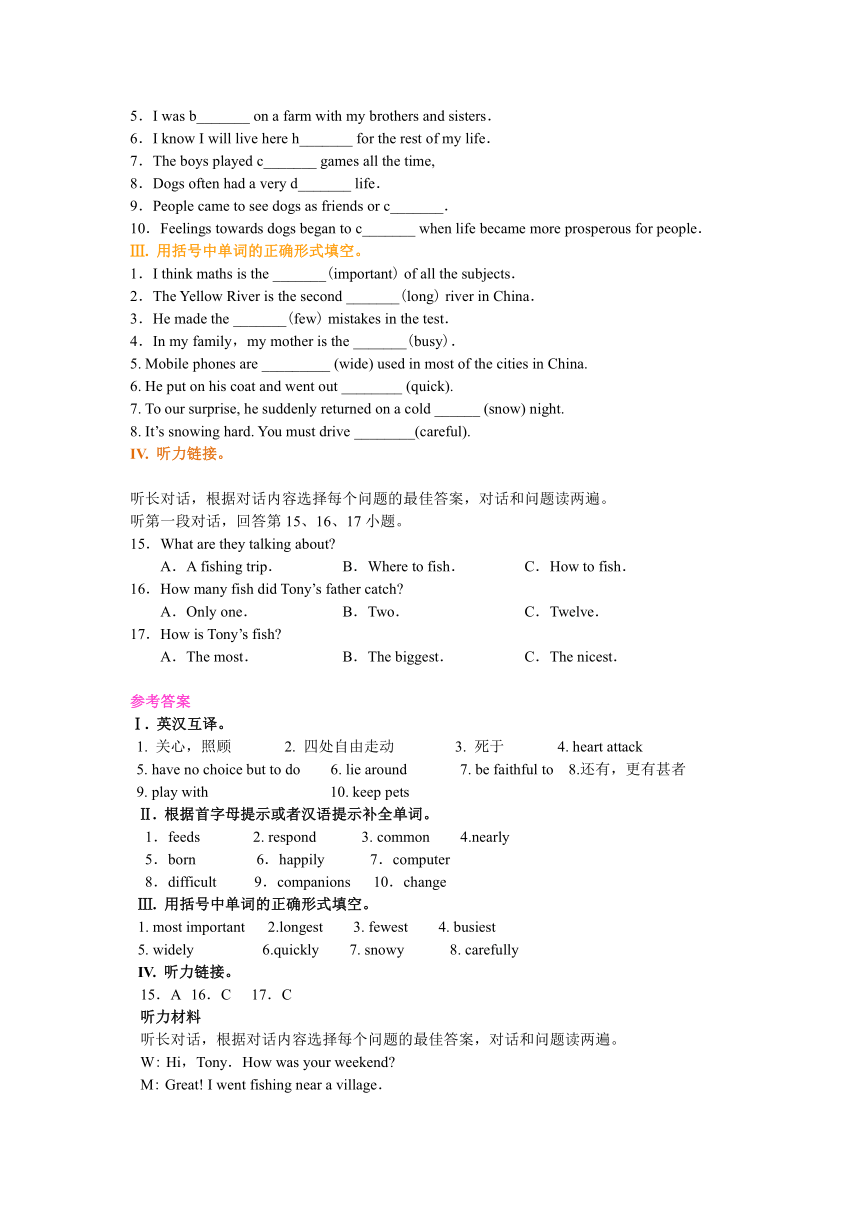牛津深圳版八年级下册Module 3 Unit 6 Pets 词句精讲精练(含答案)
文档属性
| 名称 | 牛津深圳版八年级下册Module 3 Unit 6 Pets 词句精讲精练(含答案) |

|
|
| 格式 | doc | ||
| 文件大小 | 66.0KB | ||
| 资源类型 | 教案 | ||
| 版本资源 | 牛津深圳版 | ||
| 科目 | 英语 | ||
| 更新时间 | 2023-07-12 00:00:00 | ||
图片预览




文档简介
Unit 6 Pets
词句精讲精练
词汇精讲
1. respond
(1) respond 作动词,意为“回答,对……回应”,比answer 更正式。例如:
She didn’t respond to my question. 她没有回答我的问题。
I offered to help him, but he didn’t respond. 我表示愿意帮他,但他没有回应。
(2) respond + that从句,意为“回答说……”。例如:
The doctor responded that he could not tell the name of the disease.
医生回答说他无法说出疾病的名字。
(3) 常用短语:
respond to a letter 复信;
respond to a question 答复问题;
respond with a smile 以微笑回答;
respond with a blow 报以一击;
in response to 回答,回应……
2. responsibility
(1)作不可数名词,意为“责任;责任感”。例如:
A little child does not feel much responsibility.
小孩子不感到有什么责任。
He is completely lacking in responsibility.
他完全没有责任感。
She has responsibility for public transport. 她负责公共交通。
(2)作可数名词,意为“职责, 义务”。
Keeping house is my responsibility. 管家是我的事。
I don’t feel ready to take on new responsibilities.
我觉得还没准备好接受新任务。
The club has a responsibility to its members.
俱乐部对会员负有责任。
【拓展】
responsible作形容词,意为“需负责任的,承担责任的”,后常+for/to的短语。
She is my child, and I am responsible for her.
她是我的孩子,我对她负责。
Bad weather is responsible for the poor crop.
坏天气是收成不好的原因。
We should give the job to a responsible person.
我们应将该工作委托给一个有责任心的人。
3. feed
feed作动词,意为“喂养,饲养”。常用如下搭配:
(1) feed…to…中的feed是及物动词,其后接饲料或食物名词作宾语,to为介词,其后一般接动物或小孩等名词表示对象,意为“把……喂给……吃”。
Please feed some grass to the cow. 请给牛喂点草。
She has fed milk to the baby. 她已给婴儿喂过奶。
(2) feed…on…中的feed也是及物动词,其后接人或动物作宾语, on后接食物或饲料名词,意为“用……喂……”。on可与with 替换。
The child was feeding the monkey on/with a banana.
那孩子正用香蕉喂猴子。
4. common
common意为“普通的,共同的,一般的(无比较级)”。例如:
It’s a common mistake. 这是常见的错误。
The flower is common in spring. 这种花春天很常见。
【拓展】
辨析:common, ordinary, usual, normal
(1)common“常见的,普遍的”(即“司空见惯的”意思)。例如:
common names 常见的名字; common mistakes 常犯的错误;
common 还有“共同的”意思。例如:
common interest 共同的兴趣; common language 共同语言;
(2)ordinary 普通的,平凡的(强调“平淡无奇”)。例如:
an ordinary worker 一个普通工人; ordinary-looking 相貌平常的
(3)usual 通常的,惯常的(强调“遵循常例”)。例如:
It is a usual thing with him. 这件事他习以为常。
(4)normal 正常的,正规的 (即“合乎标准”)。例如:
normal temperature 正常体温; normal state 正常状态
5. noisy
noisy作形容词,意为“嘈杂的,喧闹的,充满噪音的”。例如:
The streets were noisy and full of activity.
街上熙熙攘攘,车水马龙。
This area can be very noisy at night-time.
这个地方夜间有时会非常吵。
It is so noisy here that I can’t think.
这里太吵了,我没法思考。
【拓展】
noise可以作可数名词,也可以用作不可数名词,表示“人们不愿听到的声音或嘈杂声”。
I heard some strange noises last night. 昨夜我听见一些奇怪的响声。
There’s a lot of noise here. 这个地方人声嘈杂。
6. nearly
(1)作副词,意为“几乎,差不多”。
Tom stared at me in silence for nearly twenty seconds.
将近二十秒的时间,汤姆就那么一声不响地盯着我看。
Hunter knew nearly all of this already.
这事亨特几乎已全知道了。
Several times Lily nearly fell.
有好几次李莉都差点跌倒。
(2)作副词,意为“即将,就要”。 例如:
It was already nearly eight o’clock. 已经快8点了。
I was nearly asleep. 我差不多都睡着了。
【拓展】
almost = very nearly,指在程度上相差很少,almost可与no,none,nothing,never,nobody等表示否定意义的词连用。
I almost missed the flight. 我差一点误了航班。
Almost no one believed what he said. 几乎没人相信他的话。
7. a few
few为形容词,意为“不多,很少”,只能与可数名词搭配,表示“几乎没有”,自身有否定含义。也常与不定冠词a组成词组a few,表示“有一点”,有肯定含义。例如:
He has few friends. 他几乎没朋友。
May I ask a few questions 我可以问几个问题吗?。
【拓展】
few /a few; little/a little
(1)few/a few只能用来修饰可数名词,few表示否定,意为“没有,几乎没有”;a few表示肯定,意为“有几个,有一些”。 例如:
He has few friends here, he feels lonely. 他这里没朋友,他感觉寂寞。
There are a few eggs in the basket. 篮子里有几个鸡蛋。
(2)little/a little只能用来修饰不可数名词,little表示否定,意为“没有,几乎没有”;a little 表示肯定,意为“有一点,有一些”。 例如:
There is little ink in my bottle, and can you give me a little ink
我的瓶子里没有墨水了,你能给我点儿墨水吗?
8. run free
动词短语,意为“空转;四处走动”。 例如:
Don’t let the dog run free. 别让狗随便乱跑。
Let the rope run free. 把绳子放开。
【拓展】
(1) free表示“自由的, 空闲的,免费的”。例如:
He gets a free afternoon once a week. 他每周有一个下午空闲。
Are the drinks free 这饮料是免费的吗
(2)be free to do sth 表示“可以自由地做某事”。例如:
You are free to go or to stay. 要走要留悉听尊便。
Please feel free to ask questions. 有问题请随便问。
词汇精练
Ⅰ. 英汉互译。
1. care for ________ 2. run free _______
3. die of _________ 4.心脏病发作 ________
5. 除了……别无选择 6.懒散度日_________
7. 对……忠诚 __________ 8.what’s more _______
9. 和……玩耍 __________ 10.饲养宠物 __________
Ⅱ. 根据首字母提示或者汉语提示补全单词。
1.Emma f_______ me and takes me for walks every day. 1.feeds
2. I greeted him but he didn’t r _______.
3. We have lots of things in c_______ besides music.
4. The salesman showed her n_______ all the hats in the shop.
5.I was b_______ on a farm with my brothers and sisters.
6.I know I will live here h_______ for the rest of my life.
7.The boys played c_______ games all the time,
8.Dogs often had a very d_______ life.
9.People came to see dogs as friends or c_______.
10.Feelings towards dogs began to c_______ when life became more prosperous for people.
Ⅲ. 用括号中单词的正确形式填空。
1.I think maths is the _______(important) of all the subjects.
2.The Yellow River is the second _______(long) river in China.
3.He made the _______(few) mistakes in the test.
4.In my family,my mother is the _______(busy).
5. Mobile phones are _________ (wide) used in most of the cities in China.
6. He put on his coat and went out ________ (quick).
7. To our surprise, he suddenly returned on a cold ______ (snow) night.
8. It’s snowing hard. You must drive ________(careful).
IV. 听力链接。
听长对话,根据对话内容选择每个问题的最佳答案,对话和问题读两遍。
听第一段对话,回答第15、16、17小题。
15.What are they talking about
A.A fishing trip. B.Where to fish. C.How to fish.
16.How many fish did Tony’s father catch
A.Only one. B.Two. C.Twelve.
17.How is Tony’s fish
A.The most. B.The biggest. C.The nicest.
参考答案
Ⅰ. 英汉互译。
1. 关心,照顾 2. 四处自由走动 3. 死于 4. heart attack
5. have no choice but to do 6. lie around 7. be faithful to 8.还有,更有甚者
9. play with 10. keep pets
Ⅱ. 根据首字母提示或者汉语提示补全单词。
1.feeds 2. respond 3. common 4.nearly
5.born 6.happily 7.computer
8.difficult 9.companions 10.change
Ⅲ. 用括号中单词的正确形式填空。
1. most important 2.longest 3. fewest 4. busiest
5. widely 6.quickly 7. snowy 8. carefully
IV. 听力链接。
15.A 16.C 17.C
听力材料
听长对话,根据对话内容选择每个问题的最佳答案,对话和问题读两遍。
W: Hi,Tony.How was your weekend
M: Great! I went fishing near a village.
W: Fishing Sounds fun.
M: Yes.You spend hours waiting and then suddenly a fish comes on your line.How exciting!
W: Did you go fishing alone
M: No,my family went together.We had a fishing competition.
W: That’s interesting.What’s the result
M: My father caught the most,12 fish in a day!
W: Wow!
M: But my elder brother caught the biggest.It’s nearly 2 kilos.
W: What about you
M: I caught only one.But mom says it’s the nicest.
Qs: 15.What are they talking about
16.How many fish did Tony’s father catch
17.How is Tony’s fish
句式精讲
1. Young people can learn how to care for others by helping dogs.
care for意为“照顾,照料;想要;喜欢”。例如:
Would you care for some more tea 想再喝点茶吗
The mother cared for the sick child day and night. 母亲日夜照料着生病的孩子。
I don’t care for riding on a bike very much; I’d rather go on foot.
我不太喜欢骑自行车, 宁愿步行。
【拓展】
care about 表示“关心,在乎”,常用于否定句和疑问句。例如:
He doesn’t care about anything. 他什么也不在乎。
We should care about the poor. 我们应该关心穷人。
2. A small number of pet dogs even attack people.
a number of 意为“许多”,后面接可数名词的复数形式,谓语动词用复数形式。number前面可以用large,great,small等修饰,构成a large number of; a small number of等。例如:
I have a number of letters to write. 我有许多信件要写。
A small number of students in our class went swimming yesterday.
昨天我们班一小部分学生去游泳了。
【拓展】
the number of意为“……的数量”,后接可数名词复数,谓语动词用单数形式。例如:
The number of people speaking Chinese is larger than that of those speaking English.
说汉语的人数要大于说英语的人数。
3. What’s more,it’s common for people to live in flats.
what’s more表示递进,意为“然而/还有……,更有甚者……”,独立使用,more后面不加词和句,既可以放句首,也可以放句中,放句首时,w要大写。例如:
I don’t like pubs. They’re noisy, smelly, and what’s more, expensive.
我不喜欢酒吧。那里又吵,气味又难闻,更重要的是,花费太多。
They are going to get married, and what’s more, they are setting up in business together.
他们就要结婚了,而且还要一起做生意呢。
4. It makes a lot of noise in the evening and keep S1 from sleeping.
keep…from doing sth相当于stop...from doing sth,意为“阻止某人做某事”。例如:
The government is considering further action to keep the pound from falling in value.
政府正在考虑采取进一步行动以阻止英镑贬值。
Urgent business kept me from attending the meeting.
我因为有急事,所以没有参加会议。
【拓展】
(1) keep out意为“不让……进入,使……在外面”。例如:
The sign on the door said,“Danger!Keep Out!”
门上的牌子写着“危险!请勿靠近”。
(2) keep out of 后接名词、代词或动词-ing形式,意为“(使)留在……外面;(使)不进入”。
例如:
Keep these animals out of the fields.
别让这些动物进庄稼地里去。
Please keep out of my office. I need some peace and quiet.
请远离我的办公室。我需要一些和平和安静。
(3) keep out of 还意为“(使)不卷入,避开”。例如:
You’d better keep out of these things.
你最好别卷入这些事。
5.One day, his owner died suddenly of a heart attack.
die of 意为“因……而死”,原因多为来自内部、情感、冻饿和生病等。例如:
die of hunger (a fever, sorrow, old age) 死于饥饿 (发烧、忧伤、年老)
People are dying of cancer more and more often.
死于癌症的人越来越多了。
My grandmother died of grief soon after her husband’s death.
祖父去世不久, 祖母就因悲伤过度而死了。
【拓展】
die from 意为“由于……而死”,原因通常来自外部。例如:
die from wound (lack of food, an accident, over work, drinking, pollution)死于外伤(缺乏食物、事故、过度劳动、饮酒、污染)
In a severe winter, wild animals can die from lack of food.
在寒冷的冬天, 野兽可能因为缺乏食物而饿死。
About one out of every four Canadians will die from cancer.
大约每四个加拿大公民就有一个将死于癌症。
句式精练
I. 完成下列句子,每空一词。
1.当我打开盒子时,我发现它们中的许多都是坏的。
When I opened the box,I found that _______ _______ ______were bad.
2.遛狗可以帮助狗的主人保持健康。
Walking a dog can help the owner______ _______.
3. 别让那条狗在大街上到处乱跑。
Don’t _______ the dog _______ _______on the main road.
4. 因为这些原因,我相信狗能成为最好的宠物。
For these reasons,I believe that dogs_______ _______ _______ ______.
5.现在,如果你能等,我马上就回来。
Now if you can wait,_______ ________ ______ in a moment.
6.你最好禁止你女儿夜间外出。
You’d better keep your daughter ______ _______ ______at night.
7. 她学得很快,而且所学的全都记得。
She learns quickly, and _______ _______, she remembers what she has learnt.
8. 在寒冷的冬天,许多野生动物可能会饿死。
In a cold winter,many wild animals can______ ______ ______.
II.连词成句。
1.good,a,idea,keeping,dogs,pet,is
__________________________________________________
2.people,attack,a,small,even,dogs,number,of,pet
_____________________________________________________
3.expensive,be,finally,owning,can,dogs
______________________________________________________
4.others,than,some,dogs,badly,more,bark
______________________________________________________
5.sleep,any,getting,this,people,stops,from
______________________________________________________
6.complaints,to,respond,make,to,learn,and
______________________________________________________
III. 句型变换。
1.Liu Ying’s sister is taller than her.(改为同义句)
Liu Ying _______ _______ _______ _______ her sister.
2.He is very frightened.He can’t move.(合并为一句)
He is _______ _______ _______ move.
3.The girl is too young to go to school.(改为同义句)
The girl isn’t _______ _______ to go to school.
4.I think Chinese is more difficult than English.(改为同义句)
I think English is ________ _______ Chinese.
5.They are famous for their large noses.(对划线部分提问)
______ ______ they famous for
IV. 补全对话
根据对话内容,在每个空缺处填入一个适当的词,使整段对话意思完整。请把该空缺处的词填写在答题卡相应的位罝上。(每空限填一词)
A: Hello, are you Lin Ming
B: Yes, I am.
A: You look the 1 as your twin brother, Lin Dong.
B: As you can see, in some ways, we look the same, 2 we also have some differences.
A: What’re they
B: Though we 3 have yellow hair, my hair is shorter than his. I’m good at playing football
and he does well in drawing.
A: And
B: I’m 4 outgoing but he’s quieter. He likes to stay at home.
A: 5 is taller, you or Lin Dong
B: I’m much taller than him because I do more exercise.
参考答案
Ⅰ. 完成下列句子,每空一词。
1. most of them 2. stay healthy 3. let, run free 4. make the best pets
5. I’ll be back 6.from going out 7.what’s more 8. die of hunger
II.连词成句。
1.Keeping pet dogs is a good idea.
2.A small number of pet dogs even attack people.
3.Finally,owning dogs can be expensive.
4.Some dogs bark more badly than others.
5.This stops people from getting any sleep.
6.Learn to make and respond to complaints.
Ⅲ.句型变换。
1.isn’t as/so tall as 2.too frightened to 3.old enough
4.easier than 5.What are
IV. 补全对话。
1. same 2. but 3. both 4. more 5. Who
PAGE
词句精讲精练
词汇精讲
1. respond
(1) respond 作动词,意为“回答,对……回应”,比answer 更正式。例如:
She didn’t respond to my question. 她没有回答我的问题。
I offered to help him, but he didn’t respond. 我表示愿意帮他,但他没有回应。
(2) respond + that从句,意为“回答说……”。例如:
The doctor responded that he could not tell the name of the disease.
医生回答说他无法说出疾病的名字。
(3) 常用短语:
respond to a letter 复信;
respond to a question 答复问题;
respond with a smile 以微笑回答;
respond with a blow 报以一击;
in response to 回答,回应……
2. responsibility
(1)作不可数名词,意为“责任;责任感”。例如:
A little child does not feel much responsibility.
小孩子不感到有什么责任。
He is completely lacking in responsibility.
他完全没有责任感。
She has responsibility for public transport. 她负责公共交通。
(2)作可数名词,意为“职责, 义务”。
Keeping house is my responsibility. 管家是我的事。
I don’t feel ready to take on new responsibilities.
我觉得还没准备好接受新任务。
The club has a responsibility to its members.
俱乐部对会员负有责任。
【拓展】
responsible作形容词,意为“需负责任的,承担责任的”,后常+for/to的短语。
She is my child, and I am responsible for her.
她是我的孩子,我对她负责。
Bad weather is responsible for the poor crop.
坏天气是收成不好的原因。
We should give the job to a responsible person.
我们应将该工作委托给一个有责任心的人。
3. feed
feed作动词,意为“喂养,饲养”。常用如下搭配:
(1) feed…to…中的feed是及物动词,其后接饲料或食物名词作宾语,to为介词,其后一般接动物或小孩等名词表示对象,意为“把……喂给……吃”。
Please feed some grass to the cow. 请给牛喂点草。
She has fed milk to the baby. 她已给婴儿喂过奶。
(2) feed…on…中的feed也是及物动词,其后接人或动物作宾语, on后接食物或饲料名词,意为“用……喂……”。on可与with 替换。
The child was feeding the monkey on/with a banana.
那孩子正用香蕉喂猴子。
4. common
common意为“普通的,共同的,一般的(无比较级)”。例如:
It’s a common mistake. 这是常见的错误。
The flower is common in spring. 这种花春天很常见。
【拓展】
辨析:common, ordinary, usual, normal
(1)common“常见的,普遍的”(即“司空见惯的”意思)。例如:
common names 常见的名字; common mistakes 常犯的错误;
common 还有“共同的”意思。例如:
common interest 共同的兴趣; common language 共同语言;
(2)ordinary 普通的,平凡的(强调“平淡无奇”)。例如:
an ordinary worker 一个普通工人; ordinary-looking 相貌平常的
(3)usual 通常的,惯常的(强调“遵循常例”)。例如:
It is a usual thing with him. 这件事他习以为常。
(4)normal 正常的,正规的 (即“合乎标准”)。例如:
normal temperature 正常体温; normal state 正常状态
5. noisy
noisy作形容词,意为“嘈杂的,喧闹的,充满噪音的”。例如:
The streets were noisy and full of activity.
街上熙熙攘攘,车水马龙。
This area can be very noisy at night-time.
这个地方夜间有时会非常吵。
It is so noisy here that I can’t think.
这里太吵了,我没法思考。
【拓展】
noise可以作可数名词,也可以用作不可数名词,表示“人们不愿听到的声音或嘈杂声”。
I heard some strange noises last night. 昨夜我听见一些奇怪的响声。
There’s a lot of noise here. 这个地方人声嘈杂。
6. nearly
(1)作副词,意为“几乎,差不多”。
Tom stared at me in silence for nearly twenty seconds.
将近二十秒的时间,汤姆就那么一声不响地盯着我看。
Hunter knew nearly all of this already.
这事亨特几乎已全知道了。
Several times Lily nearly fell.
有好几次李莉都差点跌倒。
(2)作副词,意为“即将,就要”。 例如:
It was already nearly eight o’clock. 已经快8点了。
I was nearly asleep. 我差不多都睡着了。
【拓展】
almost = very nearly,指在程度上相差很少,almost可与no,none,nothing,never,nobody等表示否定意义的词连用。
I almost missed the flight. 我差一点误了航班。
Almost no one believed what he said. 几乎没人相信他的话。
7. a few
few为形容词,意为“不多,很少”,只能与可数名词搭配,表示“几乎没有”,自身有否定含义。也常与不定冠词a组成词组a few,表示“有一点”,有肯定含义。例如:
He has few friends. 他几乎没朋友。
May I ask a few questions 我可以问几个问题吗?。
【拓展】
few /a few; little/a little
(1)few/a few只能用来修饰可数名词,few表示否定,意为“没有,几乎没有”;a few表示肯定,意为“有几个,有一些”。 例如:
He has few friends here, he feels lonely. 他这里没朋友,他感觉寂寞。
There are a few eggs in the basket. 篮子里有几个鸡蛋。
(2)little/a little只能用来修饰不可数名词,little表示否定,意为“没有,几乎没有”;a little 表示肯定,意为“有一点,有一些”。 例如:
There is little ink in my bottle, and can you give me a little ink
我的瓶子里没有墨水了,你能给我点儿墨水吗?
8. run free
动词短语,意为“空转;四处走动”。 例如:
Don’t let the dog run free. 别让狗随便乱跑。
Let the rope run free. 把绳子放开。
【拓展】
(1) free表示“自由的, 空闲的,免费的”。例如:
He gets a free afternoon once a week. 他每周有一个下午空闲。
Are the drinks free 这饮料是免费的吗
(2)be free to do sth 表示“可以自由地做某事”。例如:
You are free to go or to stay. 要走要留悉听尊便。
Please feel free to ask questions. 有问题请随便问。
词汇精练
Ⅰ. 英汉互译。
1. care for ________ 2. run free _______
3. die of _________ 4.心脏病发作 ________
5. 除了……别无选择 6.懒散度日_________
7. 对……忠诚 __________ 8.what’s more _______
9. 和……玩耍 __________ 10.饲养宠物 __________
Ⅱ. 根据首字母提示或者汉语提示补全单词。
1.Emma f_______ me and takes me for walks every day. 1.feeds
2. I greeted him but he didn’t r _______.
3. We have lots of things in c_______ besides music.
4. The salesman showed her n_______ all the hats in the shop.
5.I was b_______ on a farm with my brothers and sisters.
6.I know I will live here h_______ for the rest of my life.
7.The boys played c_______ games all the time,
8.Dogs often had a very d_______ life.
9.People came to see dogs as friends or c_______.
10.Feelings towards dogs began to c_______ when life became more prosperous for people.
Ⅲ. 用括号中单词的正确形式填空。
1.I think maths is the _______(important) of all the subjects.
2.The Yellow River is the second _______(long) river in China.
3.He made the _______(few) mistakes in the test.
4.In my family,my mother is the _______(busy).
5. Mobile phones are _________ (wide) used in most of the cities in China.
6. He put on his coat and went out ________ (quick).
7. To our surprise, he suddenly returned on a cold ______ (snow) night.
8. It’s snowing hard. You must drive ________(careful).
IV. 听力链接。
听长对话,根据对话内容选择每个问题的最佳答案,对话和问题读两遍。
听第一段对话,回答第15、16、17小题。
15.What are they talking about
A.A fishing trip. B.Where to fish. C.How to fish.
16.How many fish did Tony’s father catch
A.Only one. B.Two. C.Twelve.
17.How is Tony’s fish
A.The most. B.The biggest. C.The nicest.
参考答案
Ⅰ. 英汉互译。
1. 关心,照顾 2. 四处自由走动 3. 死于 4. heart attack
5. have no choice but to do 6. lie around 7. be faithful to 8.还有,更有甚者
9. play with 10. keep pets
Ⅱ. 根据首字母提示或者汉语提示补全单词。
1.feeds 2. respond 3. common 4.nearly
5.born 6.happily 7.computer
8.difficult 9.companions 10.change
Ⅲ. 用括号中单词的正确形式填空。
1. most important 2.longest 3. fewest 4. busiest
5. widely 6.quickly 7. snowy 8. carefully
IV. 听力链接。
15.A 16.C 17.C
听力材料
听长对话,根据对话内容选择每个问题的最佳答案,对话和问题读两遍。
W: Hi,Tony.How was your weekend
M: Great! I went fishing near a village.
W: Fishing Sounds fun.
M: Yes.You spend hours waiting and then suddenly a fish comes on your line.How exciting!
W: Did you go fishing alone
M: No,my family went together.We had a fishing competition.
W: That’s interesting.What’s the result
M: My father caught the most,12 fish in a day!
W: Wow!
M: But my elder brother caught the biggest.It’s nearly 2 kilos.
W: What about you
M: I caught only one.But mom says it’s the nicest.
Qs: 15.What are they talking about
16.How many fish did Tony’s father catch
17.How is Tony’s fish
句式精讲
1. Young people can learn how to care for others by helping dogs.
care for意为“照顾,照料;想要;喜欢”。例如:
Would you care for some more tea 想再喝点茶吗
The mother cared for the sick child day and night. 母亲日夜照料着生病的孩子。
I don’t care for riding on a bike very much; I’d rather go on foot.
我不太喜欢骑自行车, 宁愿步行。
【拓展】
care about 表示“关心,在乎”,常用于否定句和疑问句。例如:
He doesn’t care about anything. 他什么也不在乎。
We should care about the poor. 我们应该关心穷人。
2. A small number of pet dogs even attack people.
a number of 意为“许多”,后面接可数名词的复数形式,谓语动词用复数形式。number前面可以用large,great,small等修饰,构成a large number of; a small number of等。例如:
I have a number of letters to write. 我有许多信件要写。
A small number of students in our class went swimming yesterday.
昨天我们班一小部分学生去游泳了。
【拓展】
the number of意为“……的数量”,后接可数名词复数,谓语动词用单数形式。例如:
The number of people speaking Chinese is larger than that of those speaking English.
说汉语的人数要大于说英语的人数。
3. What’s more,it’s common for people to live in flats.
what’s more表示递进,意为“然而/还有……,更有甚者……”,独立使用,more后面不加词和句,既可以放句首,也可以放句中,放句首时,w要大写。例如:
I don’t like pubs. They’re noisy, smelly, and what’s more, expensive.
我不喜欢酒吧。那里又吵,气味又难闻,更重要的是,花费太多。
They are going to get married, and what’s more, they are setting up in business together.
他们就要结婚了,而且还要一起做生意呢。
4. It makes a lot of noise in the evening and keep S1 from sleeping.
keep…from doing sth相当于stop...from doing sth,意为“阻止某人做某事”。例如:
The government is considering further action to keep the pound from falling in value.
政府正在考虑采取进一步行动以阻止英镑贬值。
Urgent business kept me from attending the meeting.
我因为有急事,所以没有参加会议。
【拓展】
(1) keep out意为“不让……进入,使……在外面”。例如:
The sign on the door said,“Danger!Keep Out!”
门上的牌子写着“危险!请勿靠近”。
(2) keep out of 后接名词、代词或动词-ing形式,意为“(使)留在……外面;(使)不进入”。
例如:
Keep these animals out of the fields.
别让这些动物进庄稼地里去。
Please keep out of my office. I need some peace and quiet.
请远离我的办公室。我需要一些和平和安静。
(3) keep out of 还意为“(使)不卷入,避开”。例如:
You’d better keep out of these things.
你最好别卷入这些事。
5.One day, his owner died suddenly of a heart attack.
die of 意为“因……而死”,原因多为来自内部、情感、冻饿和生病等。例如:
die of hunger (a fever, sorrow, old age) 死于饥饿 (发烧、忧伤、年老)
People are dying of cancer more and more often.
死于癌症的人越来越多了。
My grandmother died of grief soon after her husband’s death.
祖父去世不久, 祖母就因悲伤过度而死了。
【拓展】
die from 意为“由于……而死”,原因通常来自外部。例如:
die from wound (lack of food, an accident, over work, drinking, pollution)死于外伤(缺乏食物、事故、过度劳动、饮酒、污染)
In a severe winter, wild animals can die from lack of food.
在寒冷的冬天, 野兽可能因为缺乏食物而饿死。
About one out of every four Canadians will die from cancer.
大约每四个加拿大公民就有一个将死于癌症。
句式精练
I. 完成下列句子,每空一词。
1.当我打开盒子时,我发现它们中的许多都是坏的。
When I opened the box,I found that _______ _______ ______were bad.
2.遛狗可以帮助狗的主人保持健康。
Walking a dog can help the owner______ _______.
3. 别让那条狗在大街上到处乱跑。
Don’t _______ the dog _______ _______on the main road.
4. 因为这些原因,我相信狗能成为最好的宠物。
For these reasons,I believe that dogs_______ _______ _______ ______.
5.现在,如果你能等,我马上就回来。
Now if you can wait,_______ ________ ______ in a moment.
6.你最好禁止你女儿夜间外出。
You’d better keep your daughter ______ _______ ______at night.
7. 她学得很快,而且所学的全都记得。
She learns quickly, and _______ _______, she remembers what she has learnt.
8. 在寒冷的冬天,许多野生动物可能会饿死。
In a cold winter,many wild animals can______ ______ ______.
II.连词成句。
1.good,a,idea,keeping,dogs,pet,is
__________________________________________________
2.people,attack,a,small,even,dogs,number,of,pet
_____________________________________________________
3.expensive,be,finally,owning,can,dogs
______________________________________________________
4.others,than,some,dogs,badly,more,bark
______________________________________________________
5.sleep,any,getting,this,people,stops,from
______________________________________________________
6.complaints,to,respond,make,to,learn,and
______________________________________________________
III. 句型变换。
1.Liu Ying’s sister is taller than her.(改为同义句)
Liu Ying _______ _______ _______ _______ her sister.
2.He is very frightened.He can’t move.(合并为一句)
He is _______ _______ _______ move.
3.The girl is too young to go to school.(改为同义句)
The girl isn’t _______ _______ to go to school.
4.I think Chinese is more difficult than English.(改为同义句)
I think English is ________ _______ Chinese.
5.They are famous for their large noses.(对划线部分提问)
______ ______ they famous for
IV. 补全对话
根据对话内容,在每个空缺处填入一个适当的词,使整段对话意思完整。请把该空缺处的词填写在答题卡相应的位罝上。(每空限填一词)
A: Hello, are you Lin Ming
B: Yes, I am.
A: You look the 1 as your twin brother, Lin Dong.
B: As you can see, in some ways, we look the same, 2 we also have some differences.
A: What’re they
B: Though we 3 have yellow hair, my hair is shorter than his. I’m good at playing football
and he does well in drawing.
A: And
B: I’m 4 outgoing but he’s quieter. He likes to stay at home.
A: 5 is taller, you or Lin Dong
B: I’m much taller than him because I do more exercise.
参考答案
Ⅰ. 完成下列句子,每空一词。
1. most of them 2. stay healthy 3. let, run free 4. make the best pets
5. I’ll be back 6.from going out 7.what’s more 8. die of hunger
II.连词成句。
1.Keeping pet dogs is a good idea.
2.A small number of pet dogs even attack people.
3.Finally,owning dogs can be expensive.
4.Some dogs bark more badly than others.
5.This stops people from getting any sleep.
6.Learn to make and respond to complaints.
Ⅲ.句型变换。
1.isn’t as/so tall as 2.too frightened to 3.old enough
4.easier than 5.What are
IV. 补全对话。
1. same 2. but 3. both 4. more 5. Who
PAGE
同课章节目录
